European elections: Ten highlights
- Published
The European elections will be remembered as an "earthquake" which rocked the EU's political establishment.
In two of the EU's biggest countries - France and the UK - anti-EU, anti-immigration parties came top. And in struggling Greece it was a Eurosceptic party of the left - Syriza - which won.
Yet overall the pro-EU parties remained the dominant players.
Here are 10 highlights of the elections, in which millions of Europe's voters protested against their leaders - or simply did not bother to vote.

National Front victory
Marine Le Pen says her National Front party will "defend France"
For the first time the far-right National Front (FN) won a French national election. It will send 24 MEPs to Brussels - compared with just three elected in 2009.
A triumphant Marine Le Pen said she would fight "crazy measures like votes for immigrants".
Her party trounced the ruling Socialists of President Francois Hollande, beaten into third place.
It was a painful blow for the unpopular president, as France has always been at the heart of the European project.
Mr Hollande said it was a "problem" not only for France but for Europe as a whole - a problem which had "tarnished the image of France".
German Finance Minister Wolfgang Schaeuble deplored the result, labelling the FN "fascist".
Francois Hollande: "This vote is there and it needs to be confronted"

UKIP breaks the mould
A breakthrough for Nigel Farage's UKIP - but a near wipe-out for the Lib Dems, as Nick Robinson reports
In the UK, Nigel Farage's anti-EU UK Independence Party (UKIP) pulled off a similar triumph. "The UKIP fox is in the Westminster henhouse," Mr Farage said, after making political history by breaking the Conservative-Labour duopoly in a national election.
Like the FN, UKIP boosted its tally of MEPs to 24. But it is not yet clear who its new allies will be in the European Parliament - Mr Farage has ruled out any deal with Ms Le Pen.
UKIP now has its sights on Westminster - though the British "first-past-the-post" electoral system makes it a lot harder for small parties to win seats.
UKIP is campaigning for a British exit from the EU, and calls for tough curbs on immigration.

Wilders disappointed
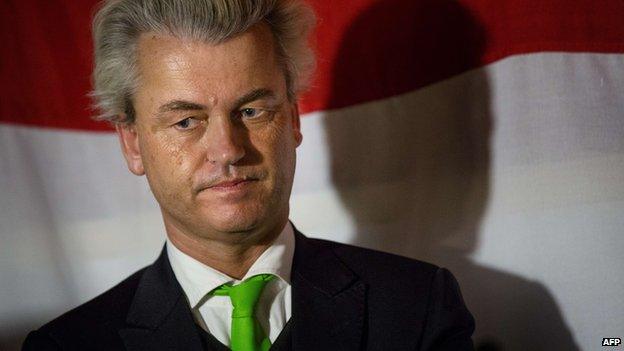
Geert Wilders failed to match Eurosceptic gains in other countries
The anti-EU trend was not repeated in the Netherlands, despite predictions that the Freedom Party (PVV) of Geert Wilders was poised to do well.
The anti-immigration, anti-Islam PVV won just three seats and fell to fourth place - well behind liberal and centre-left, pro-EU parties.
Before the election the PVV and Ms Le Pen's FN vowed to team up in a new Eurosceptic bloc, but such an alliance has been much weakened by the Dutch result.

New Alternative
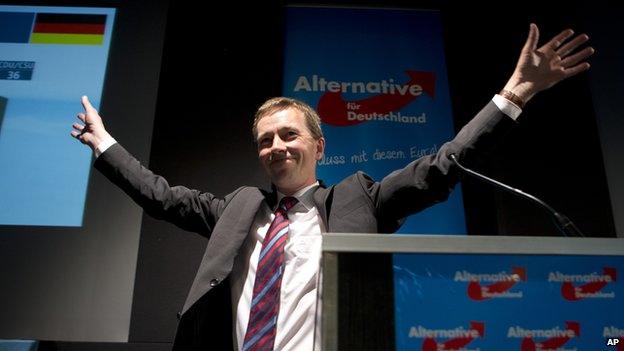
AfD leader Bernd Lucke: The party does not go in for soundbites or razzmatazz
In solidly pro-EU Germany a new anti-euro party, Alternative for Germany (AfD), made its mark, winning seven seats.
It is now in the 67-strong non-aligned bloc called "Others" in the new parliament - independent parties which campaigned on a host of different issues.
AfD is not anti-EU but believes the euro is fundamentally flawed and says German taxpayers must not pay the bills for reckless governments or banks in other EU countries.

Far-right gains
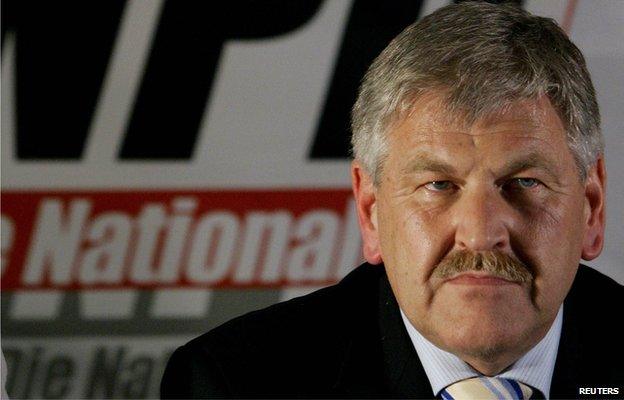
Udo Voigt's party used inflammatory images and language in its campaign
Another surprise in the German election was that a neo-Nazi politician, Udo Voigt, was elected, for the National Democratic Party (NPD). For years there has been heated debate in Germany about banning the NPD, but many fear that a ban would only drive the membership underground.
In Greece the new ultra-nationalist Golden Dawn party - often described as "neo-Nazis" too - won three seats. The party, whose leaders are under criminal investigation, came third.
Uniforms and fascist-era emblems are also a feature of Jobbik in Hungary, which won three seats.
A common feature of the parties is their hostility towards immigrants. In some cases party activists have been involved in racist attacks.

Renzi's centre-left triumph
Alan Johnston: "The night belonged to...Matteo Renzi, who remains a believer in the European dream"
Italy had a relatively high turnout - 60% - and voters gave strong backing to the new prime minister Matteo Renzi, leader of the centre-left Democratic Party (PD).
Many were surprised by the scale of his win. His rise in national politics has been meteoric - not long ago he was mayor of Florence, and did not even have a seat in parliament.
Mr Renzi's PD came well ahead of the anti-establishment, Eurosceptic Five Star Movement of Beppe Grillo, and the right-wing Forza Italia party of former PM Silvio Berlusconi.
It was an encouraging sign for pro-EU leaders who hope that Mr Renzi's reforms can revive the ailing Italian economy.

Left-wing Eurosceptics
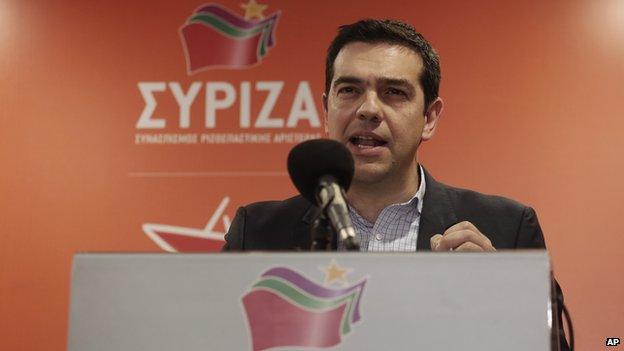
Alexis Tsipras rejects the bitter austerity medicine that Greece has been ordered to take
In Greece and Spain there were impressive results for new radical left Eurosceptic parties.
The Syriza party led by Alexis Tsipras won in Greece with 26.6%. He also led the European Left bloc, condemning the EU/IMF bailout conditions for Greece as "catastrophic". He wants new national elections and a full renegotiation of the Greek bailout.
The rise of radical left parties in Spain also disrupted the traditional political order there. Spain's two dominant parties - of centre-left and centre-right - dropped below 50% of the vote, in a historic result. The new Podemos party, born of the indignados protest movement, surged into fourth place, just behind the former communists.
Pablo Iglesias, founder of Spain's Podemos (We Can) party: "We don't want to be a German colony"

Turnout still a problem
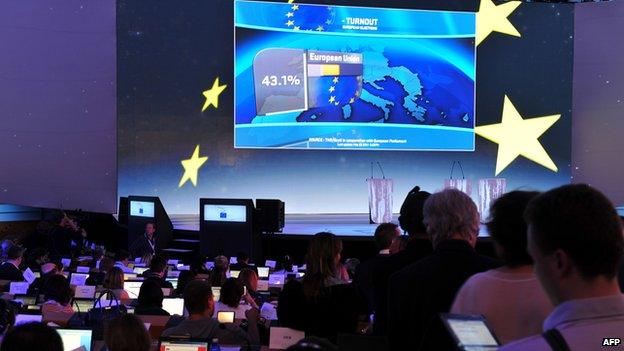
A big screen showed the EU-wide turnout figures in the European Parliament
On results night at the European Parliament there was a solemn announcement before the official results came in: the "inevitable" decline in turnout had been reversed. By how much? Well, 0.1%. So this time overall turnout was 43.1%.
But as the dust settled the overall picture was not encouraging. Yes, turnout was very high in countries where voting is compulsory, such as Belgium, Luxembourg and Malta.
But turnout was very low in much of Eastern Europe - Slovakia was lowest, with just 13%. And in Poland, where EU membership is very popular, it was just 23%. East European countries are net recipients from the EU budget - yet their people appear disengaged from EU politics.

Spitzenkandidaten
The European economy dominated the candidates debate, as Gavin Hewitt reports
A new German word entered the EU vocabulary in this election: "Spitzenkandidaten". It refers to the lead candidates of the party blocs in the parliament, vying to become the next EU Commission president.
For the first time in a European election these party rivals held live TV debates about EU policy, presenting their platforms to millions of voters across Europe.
It was an effort to bring the EU closer to ordinary people - but also an exercise in power politics. European Parliament leaders were showing that they would not let EU governments impose a Commission president on them. Under the Lisbon Treaty, the governments have to "take account" of the election result when they choose the EU's most powerful bureaucrat. In theory that gives the voters some influence, albeit indirectly.

Will it be Juncker?
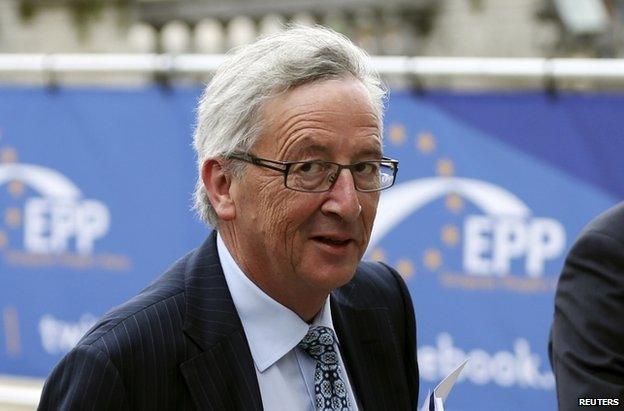
Jean-Claude Juncker in Brussels
The centre-right European People's Party (EPP) won overall, despite losing more than 60 seats. But it is not clear whether the EPP 's candidate Jean-Claude Juncker, a veteran of EU politics, will succeed in his bid to become next Commission president.
An EU leaders' summit on 27 May marked the start of hard bargaining over the top Commission job and his or her new team, who will draft EU laws in Brussels. A name should be finalised by the end of June - but then the whole Commission still has to get approval from the new parliament. That process will not be complete until October at the earliest.
Some EU leaders - notably the UK's David Cameron and Hungary's Viktor Orban - are likely to oppose Mr Juncker's bid. And Germany's Chancellor Angela Merkel has not given him firm backing.